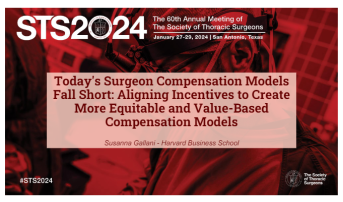STS Survey Identifies Stark Gender Disparities in Compensation
Leaders say that transparency and identification of the problem is the first step toward fixing it.

SAN ANTONIO, TX—The Society of Thoracic Surgeons (STS) has published its first comprehensive report on member compensation from specialty-specific survey data. The numbers highlight substantial pay disparities, especially between men and women.
Congenital surgeons topped the median salary list at $918,225 (9,500 work relative value units, or wRVUs) followed by cardiac surgeons at $900,000 (11,000 wRVUs), those in a hybrid practice at $877,500 (11,000 wRVUs), and general thoracic surgeons at $642,500 (7,200 wRVUs).
“The purpose of this information is not so the STS can have it,” Thomas MacGillivray, MD (MedStar Washington Hospital Center, Washington, DC), commented during a standing room-only session dedicated to the findings here at the 2024 STS meeting.
“What we want to do is to get this collective information, break it down as you are doing, and give it to our members—our individual members—so they can use this knowledge for their negotiations with their executives,” said MacGillivray. Another goal is to “try to understand where there are disparities, and if there are disparities to figure out if there are inequities and then fix them.”
Compensation Findings
Both the survey, which was sent to all 3,135 active surgeon members of STS in October 2023 with a response rate of 27%, and the presidential task force that developed it were created as a reaction to institutional-level data presented by Cherie Erkmen, MD (Temple University Hospital, Philadelphia, PA), at last year’s conference. Her findings, which were subsequently published in the Annals of Thoracic Surgery, showed that female cardiothoracic surgeons earned between $0.71 to $0.86 for every dollar earned by their male counterparts in 2021.
Here at this year’s meeting, Erkmen presented new findings from the member-driven survey that echoed her original results. By total salary, women, she said, earn $0.78, $0.81, $0.75, and $0.94 on the dollar compared with men across cardiac surgery, general thoracic surgery, congenital surgery, and hybrid practice, respectively.
It takes courage to own this data and to do something with it. Cherie Erkmen
Strikingly, these discrepancies did not disappear with work experience: if anything, they worsened. “Women in cardiac surgery who are 11-20 years out of practice earn less than men who are 0-5 years out of practice,” Erkmen reported.
“I know that looking at this data is difficult, especially as we're seeing disparities and that can be embarrassing for us, but we're not different from other surgical specialties or other medical specialties or the workforce in the US in general,” Erkmen said during the session. “But where we are different is that we are actually measuring it and we have the ability to leverage this information to make a change for good. It takes courage to own this data and to do something with it.”
Diving Into the Gender Disparity
Michael Mack, MD (Baylor Scott & White Health, Plano, TX), who presented the main STS survey data, told TCTMD he was not surprised by any of the findings. Prior to this survey being done, “there were multiple sources of data out there that were all over the place, and I think that this was a start to getting to the ground truth,” he said. “I think transparency is always a good thing.”
What will be telling is following the trends down the line now that a baseline is established, Mack continued. “With the gender disparity, we need to know if the measures we're taking are fixing that or not. We can't just say that we've done this and we're confident of it. We've got to show it. So everything needs to be evidence based, and this is the initial attempt at getting the answers.”
Susanna Gallani, PhD (Harvard Business School, Boston, MA), an economist who presented data on equitable and value-based compensation models, said in the session that she was “sadly” not surprised by the gender disparities observed. “I would want to know more about what is driving the gender disparity,” she said. “We cannot solve the problem until we know where the problem is.”
To TCTMD, Erkmen said it’s hard to know all the drivers, but pointed out that “there was an approach toward equity” for surgeons in hybrid practices and for those serving small communities. Additionally, the RVUs among those with more than 75% clinical work, particularly for cardiac surgeons, are essentially equivalent, “so that's interesting that it's purely [with] the work output that we start to get equity,” she said. “But where we see a difference is when we have these nonreimbursable actions in academic medicine, so things like teaching, mentoring, research, and service to the institution through committees.”
Erkmen said women are often vulnerable to bias, especially when it comes to having and raising families. “However, we're childbearing and child rearing only during a certain specific time point, and yet when women who are 11-20 years out of practice are outside of that window, they're [still] compensated less,” she stressed.
To TCTMD, Lauren Barron, MD (Baylor College of Medicine, Houston, TX), said the data will be helpful in closing the pay gap. “Despite all the many reasons we've been told in the past that the pay gap exists—'you do less, you have family responsibilities, you don't have the big cases’—now we can say, ‘Well, turns out no. I do the same work, I just get paid less to do it.’”
Some Concerns
Making compensation data public in this way was not met with total excitement by everyone.
Barron said she was concerned that publishing absolute numbers of surgeon compensation could put a “target” on those physicians, especially if they might lack financial savvy, for scammers. Additionally, she pointed out, “we don't all make median, not even close.”
Gallani acknowledged that “when we report median values or averages, everybody who's below the median feels really bad about themselves.” While the instinct might be to push upward in salary, that could create problems in the environment of healthcare that is currently facing downward pressure to reduce cost, she said. “We could hope for a shrinking of the variability, but I don't know economically that that model would stand the test of time. . . . I'm hoping that people will be rewarded better, not necessarily more, with respect to the value that they add.”
Now we can say, ‘Well, turns out no. I do the same work, I just get paid less to do it.’ Lauren Barron
Erkmen, too, said while she is proud of the data and their potential to make a difference, she shared concern regarding how the disparity might discourage potential cardiothoracic surgical candidates, especially women, from entering the field. However, Erkmen stressed that “it's a disparity that's shared by all professions, and we are taking the lead in transparency and action that hopefully will actually recruit more women to the field.”
Mack agreed. “I'd hope the message is the same disparity exists here as exists elsewhere but we're committed to fixing it and we're committed to parity,” he said. “So hopefully that would be an attraction rather than a discouragement.”
Future Directions
The task force plans to improve and reissue this survey on an annual basis and called upon members to participate in greater numbers next year.
One survey item Mack said he would like to see included in the future is starting salaries. “The [person] least advantaged in terms of negotiation with an employer is somebody that's just finishing training and starting out,” he said. “Those are the people that we need to be helping the most.”
Erkmen said she would like to see more information collected on race, as the initial survey responses did not contain enough data points to see how race factors into compensation.
If you are paying one person less per RVU than someone else because of any gender or race issue, you've got a real problem and that’s got to be fixed fast. Robert Cerfolio
Task force member Shanda Blackmon, MD, MPH (Mayo Clinic, Rochester, MN), reminded attendees of their federally protected right to disclose their salary. “I had several people call me to tell me that their administrators told them not to participate in the survey, that they were not permitted by their hospital to share their salary,” she said. “If you want to participate in this survey next year, make sure you know your rights.”
Broadly speaking, Gallani urged surgeons to take these data and, if moved to do so, to “ask a lot of questions” regarding their own compensation, keeping in mind that money is not the only driver of value. “A lot of people are still not satisfied and not feeling valued, even if they are at the right tail of the distribution,” she said, adding that nonmonetary compensation like working conditions and schedule can increase satisfaction.
Task force member Robert Cerfolio, MD, MBA (NYU Langone Health, New York, NY), issued a call to action to all surgeons in a position of power to take steps to close gaps where they see them. “You better take care of business in your own shop,” he said. “If you are paying one person less per RVU than someone else because of any gender or race issue, you've got a real problem and that’s got to be fixed fast. There’s no reason not to fix it tomorrow.”
Yael L. Maxwell is Senior Medical Journalist for TCTMD and Section Editor of TCTMD's Fellows Forum. She served as the inaugural…
Read Full BioSources
Mack M. STS surgeon compensation survey: a report of the STS presidential task force. Presented at: STS 2024. January 27, 2024. San Antonio, TX.
Erkmen C. STS surgeon compensation survey analysis by gender and race: a report of the STS presidential task force. Presented at: STS 2024. January 27, 2024. San Antonio, TX.
Gallani S. Today's surgeon compensation models fall short: aligning incentives to create more equitable and value-based compensation models. Presented at: STS 2024. January 27, 2024. San Antonio, TX.
Disclosures
- Mack reports relationships with Carmat, Edwards Lifesciences, and Medtronic.
- Erkmen and Gallani report no relevant conflicts of interest.






Comments